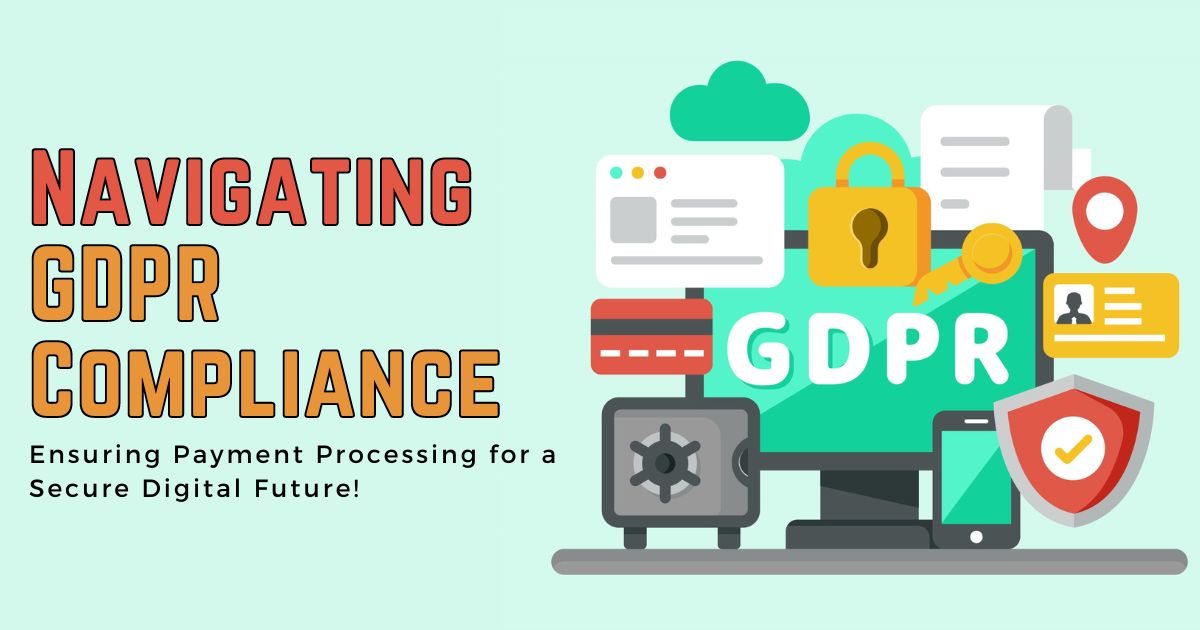
| January 4th, 2024 |
Navigating GDPR Compliance — Ensuring Payment Processing for a Secure Digital Future!
In an era where digital transactions and data-driven processes dominate the business landscape, the General Data Protection Regulation (GDPR compliance) stands as a beacon for safeguarding individuals’ privacy rights. This comprehensive regulation, enacted by the European Union (EU), aims to harmonize data protection laws across the member states, bolstering the control individuals have over their personal data. In this blog post, we will explore the full details of GDPR and dissect its profound impact on payment processing within the dynamic realm of the financial sector.
Understanding GDPR — A Comprehensive Overview:
1. Key Principles of GDPR:
GDPR is built on several fundamental principles designed to protect the privacy and rights of individuals. These include the lawful and transparent processing of data, limiting data collection to what is necessary, ensuring data accuracy, and implementing robust security measures.
2. Scope and Applicability:
GDPR is not limited to organizations based in the EU; it applies to any entity that processes personal data of EU residents. This extraterritorial reach ensures a global impact, compelling businesses worldwide to adhere to its stringent regulations.
3. Rights of Data Subjects:
GDPR empowers individuals with certain rights over their personal data. These include the right to access, rectify, erase, and port their data. Additionally, individuals have the right to be informed about the processing of their data and the purpose behind it.
4. Data Protection Officers (DPOs):
Organizations handling large-scale data processing or dealing with sensitive data are required to appoint a Data Protection Officer. The DPO is responsible for ensuring compliance with GDPR and acts as a liaison between the organization, data subjects, and supervisory authorities.
The Impact of GDPR on Payment Processing —
1. Data Minimization and Purpose Limitation:
Payment processors often deal with vast amounts of personal and financial data. GDPR mandates the principle of data minimization, emphasizing that only the necessary data for a specific purpose should be collected. Payment processors must be vigilant in ensuring they only process data essential for transaction purposes and adhere to purpose limitation principles.
2. Consent Management:
GDPR places a significant emphasis on obtaining explicit and informed consent from individuals before processing their data. In the context of payment processing, this means that organizations must be transparent about the data they collect, how it will be used, and obtain clear consent from users.
3. Security Measures and Data Breach Notification:
Payment processors are entrusted with sensitive financial information. GDPR requires organizations to implement robust security measures to protect this data from unauthorized access or disclosure. In the event of a data breach, organizations must promptly notify both the supervisory authority and affected individuals, ensuring transparency and accountability.
4. Cross-Border Data Transfers:
Many payment processing operations involve the transfer of data across borders. GDPR imposes strict requirements on such international data transfers. Adequate safeguards, such as Standard Contractual Clauses (SCCs) or Binding Corporate Rules (BCRs), must be in place to ensure that the data is protected to GDPR standards, regardless of its location.
5. Impact on Third-Party Service Providers:
Payment processors often rely on third-party service providers for various functions. GDPR requires organizations to conduct thorough due diligence on these service providers, ensuring they comply with GDPR standards. Contracts with third parties should include explicit data protection obligations, making all parties accountable for maintaining compliance.
6. Individual Rights and Data Portability in Payments:
GDPR grants individuals the right to access and transfer their personal data between service providers. In payment processing, this translates to individuals having the right to access their transaction history and financial data, as well as the ability to transfer this information to another payment service provider.
7. Challenges and Compliance Costs:
Achieving and maintaining GDPR compliance in payment processing can pose significant challenges for organizations. The implementation of robust data protection measures, regular audits, and ensuring continuous compliance all contribute to increased operational costs. However, the cost of non-compliance, including potential fines and reputational damage, far outweighs the investment in compliance.
8. GDPR Fines and Enforcement:
GDPR grants supervisory authorities the power to impose fines for non-compliance. The fines can be substantial, reaching up to €20 million or 4% of the global annual turnover, whichever is higher. The threat of such fines serves as a powerful incentive for payment processors to prioritize GDPR compliance.
9. Data Protection Impact Assessments (DPIAs):
GDPR requires organizations, especially those involved in high-risk processing activities, to conduct Data Protection Impact Assessments. In the context of payment processing, DPIAs are essential for identifying and mitigating potential risks to individuals’ privacy. This proactive approach helps organizations ensure that their payment processing activities comply with GDPR from the outset.
10. Employee Training and Awareness:
Employees play a crucial role in maintaining GDPR compliance. Organizations in the payment processing sector must invest in comprehensive training programs to educate employees about GDPR requirements, emphasizing the importance of protecting personal and financial data. Heightened awareness among staff reduces the likelihood of inadvertent breaches and strengthens the overall security posture.
11. Incident Response and Breach Notification Plans:
Payment processors need to develop robust incident response plans to address data breaches promptly. GDPR mandates the notification of supervisory authorities and affected individuals within 72 hours of becoming aware of a breach. Having well-defined processes in place ensures a swift and coordinated response, minimizing the impact of a security incident.
12. Technology Solutions for Compliance:
Leveraging technology solutions can significantly aid payment processors in achieving and maintaining GDPR compliance. Advanced encryption, secure payment gateways, and data anonymization techniques are among the tools that help protect sensitive information. Regularly updating and monitoring these technologies ensures ongoing adherence to GDPR standards.
13. Global Privacy Standards:
While GDPR sets a high standard for data protection, payment processors should also be cognizant of other global privacy regulations. Understanding and aligning with regulations such as the California Consumer Privacy Act (CCPA) and emerging frameworks in other regions helps create a comprehensive approach to global data protection, especially if the organization operates in multiple jurisdictions.
14. Ethical Considerations in Data Processing:
GDPR not only focuses on legal compliance but also underscores the ethical responsibility of organizations in handling personal data. Payment processors should adopt ethical practices, ensuring transparency, fairness, and accountability in their data processing activities. Building trust with customers goes beyond compliance and contributes to long-term relationships.
15. Continuous Monitoring and Auditing:
Achieving GDPR compliance is not a one-time effort but an ongoing commitment. Regularly monitoring and auditing data processing activities help identify areas of improvement, ensuring that organizations stay ahead of evolving threats and regulatory changes. Continuous compliance efforts demonstrate a commitment to data protection and privacy.
16. Industry Collaboration and Best Practices:
Payment processors can benefit from collaborating with industry peers and participating in forums or associations focused on data protection. Sharing best practices, lessons learned, and staying informed about emerging trends in payment processing and data protection enhance the collective ability of the industry to address challenges and adapt to evolving regulatory landscapes.
17. User Education and Communication:
Educating users about the measures taken to protect their data fosters transparency and builds trust. Clearly communicating privacy policies, data processing practices, and the steps taken to comply with GDPR requirements helps users make informed decisions about engaging with payment processors.
Q&A Section — Navigating GDPR in Payment Processing:
Q1: How does GDPR impact payment processors’ daily operations?
A1: GDPR significantly influences payment processors by requiring them to implement data protection measures, obtain explicit consent for data processing, and ensure secure cross-border data transfers. It also mandates adherence to principles like data minimization and purpose limitation.
Q2: What steps can payment processors take to ensure GDPR compliance in their third-party relationships?
A2: Payment processors should conduct thorough due diligence on third-party service providers, ensuring they comply with GDPR standards. Contracts should explicitly outline data protection obligations, and continuous monitoring should be in place to guarantee ongoing compliance.
Q3: How does GDPR affect the way payment processors handle data breaches?
A3: GDPR mandates prompt notification of supervisory authorities and affected individuals within 72 hours of discovering a data breach. Payment processors must develop robust incident response plans to ensure swift and coordinated actions to mitigate the impact of such incidents.
Q4: What role do Data Protection Impact Assessments (DPIAs) play in the context of payment processing under GDPR?
A4: DPIAs are essential for identifying and mitigating risks associated with high-risk processing activities in payment processing. They serve as a proactive measure to ensure that data processing activities comply with GDPR requirements and prioritize the privacy and security of individuals.
Q5: How can payment processors navigate the challenges of ensuring global compliance beyond GDPR?
A5: Payment processors should be aware of and align with other global privacy regulations, such as the California Consumer Privacy Act (CCPA). Adopting a holistic approach that considers various privacy frameworks ensures comprehensive compliance, especially for organizations operating in multiple jurisdictions.
Q6: What steps can payment processors take to educate their employees about GDPR and data protection?
A6: Payment processors should invest in comprehensive training programs to educate employees about GDPR requirements and the importance of protecting personal and financial data. Regular training sessions and awareness programs contribute to a culture of data protection within the organization.
Q7: How can technology solutions aid payment processors in achieving and maintaining GDPR compliance?
A7: Advanced encryption, secure payment gateways, and data anonymization techniques are technology solutions that help protect sensitive information. Regularly updating and monitoring these technologies ensures ongoing adherence to GDPR standards and enhances the overall security posture.
Q8: What ethical considerations should payment processors keep in mind while processing personal data?
A8: Payment processors should adopt ethical practices, emphasizing transparency, fairness, and accountability in their data processing activities. Beyond legal compliance, ethical considerations contribute to building trust with customers and fostering long-term relationships.
Q9: How can payment processors stay informed about emerging trends and regulatory changes in data protection?
A9: Active participation in industry forums, collaboration with peers, and engagement with associations focused on data protection help payment processors stay informed about emerging trends and regulatory changes. Continuous monitoring and auditing also contribute to adapting to evolving challenges.
Q10: How does GDPR compliance contribute to building trust with users in payment processing?
A10: GDPR compliance assures users that their personal and financial data is handled with the utmost care and transparency. Communicating privacy policies, data processing practices, and the steps taken to comply with GDPR requirements helps build trust and loyalty among users.
Conclusion —
The implementation of GDPR has undoubtedly reshaped the landscape of data protection and privacy in the digital age. For payment processors, navigating the complex terrain of GDPR compliance is not just a legal obligation but a strategic imperative. By adhering to the core principles of GDPR, payment processors can build trust with their users, mitigate the risk of data breaches, and contribute to a more secure and privacy-conscious digital ecosystem. As technology continues to advance, staying informed, proactive, and compliant with evolving regulations is key to ensuring a resilient and responsible future for payment processing in the global marketplace.
